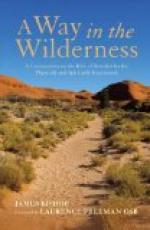Wherever there are barrens—treeless plains in the midst of dense forest—the caribou collect in small herds as winter comes on, following the old gregarious instinct. Then each one cannot do as he pleases any more; and it is for this winter and spring life together, when laws must be known, and the rights of the individual be laid aside for the good of the herd, that the young are trained.
One afternoon in late summer I was drifting down the Toledi River, casting for trout, when a movement in the bushes ahead caught my attention. A great swampy tract of ground, covered with grass and low brush, spread out on either side the stream. From the canoe I made out two or three waving lines of bushes where some animals were making their way through the swamp towards a strip of big timber which formed a kind of island in the middle.
Pushing my canoe into the grass, I made for a point just astern of the nearest quivering line of bushes. A glance at a bit of soft ground showed me the trail of a mother caribou with her calf. I followed cautiously, the wind being ahead in my favor. They were not hurrying, and I took good pains not to alarm them.
When I reached the timber and crept like a snake through the underbrush, there were the caribou, five or six mother animals, and nearly twice as many little ones, well grown, which had evidently just come in from all directions. They were gathered in a natural opening, fairly clear of bushes, with a fallen tree or two, which served a good purpose later. The sunlight fell across it in great golden bars, making light and shadow to play in; all around was the great marsh, giving protection from enemies; dense underbrush screened them from prying eyes—and this was their schoolroom.




